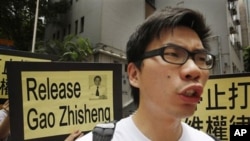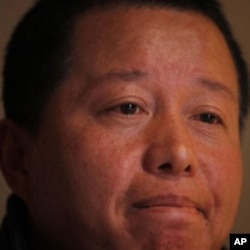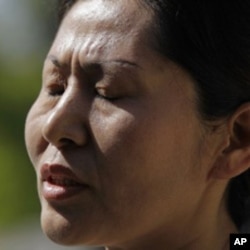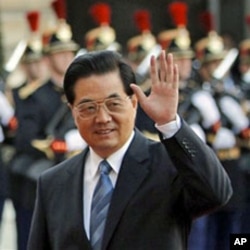The family of Gao Zhisheng, one of China's most prominent human rights lawyers, will see its first Thanksgiving in the United States this year. But they will not be sharing their new American experience with Gao. He went missing February 2009 then briefly resurfaced in April of this year and has not been heard from since.
Listen to Kate Woodsome's interview:
Once praised as one of China's 10 best lawyers, Gao fell out of Beijing's favor when he began defending ethnic minorities and victims of religious persecution. The Chinese Foreign Ministry says Gao has been charged with subverting state power. But his family does not know where he is. They fled China, complaining of persecution, and are now living in the U.S. state of California.
Gao's daughter, 17-year-old Grace Geng, shares her story with VOA's Kate Woodsome.
When you were 12 years-old, the police beat you and your mother and security agents moved into your house. What was it like to live like that?
At that time, my home had eight policemen living in my home, and then four policemen right outside our house. And there were more policemen at the stairs and it feels like a few hundred downstairs in the courtyard. When my dad was arrested, I really did not know why he was arrested because my dad really never told me what was going on. And I never read the articles he wrote, either. He only told me that he was doing the right thing. That's all I knew. I felt really bad at that time because they didn't let me to go to school until sometime later. And I just felt so hopeless. And I felt really bad.
When you were finally able to go to school, the police officers would go with you and would even go into the bathroom with you.
I felt very insulted at that time because they did not let me to go to school for a few days. And something must have happened during those few days. Because we had 2,000 students in that school, and two buildings. And after those few days, I noticed that 1,900 of the students moved to one building. Only 100 remained in the building where I went to school. And they took off all the doors of all the bathrooms, the female bathrooms. And only the main doors remained. They could listen to you when you talked in the bathroom and they could see you. So I just felt very insulted.
How did you cope with your stress and escape from the horror that was happening?
Really, I did not have any special way to cope with this. I really was hoping that I'd have a friend to talk to. But at that time, the policemen were telling all the people, all the students in the school, that if they talked to me, they would go to prison. And also, they said that I had AIDS and I had other kinds of nasty diseases so that the people wouldn't talk to me. Really, there was no one there to talk to me at that time in the school. But I was really hoping that I had a friend to talk to.
How had your father changed after his arrest in 2006?
When my dad came home, he seldom spoke. He was really most of the time in his own bedroom. And I could feel that he had really bad health. When he was trying to tie his shoes, he could not bend down. And then, his skin all went dark. After he ate, many times he had to go to the bathroom immediately because he had diarrhea.
Your father is said to have been severely tortured in prison. Did he tell you that?
I did not know anything about my father being tortured until I escaped to Thailand, and there was an article by my father and in that article, he documented some of the torture he experienced. But my mom never let me to read that article. Only one day, when they went out, I just took the article. I was all by myself in the house, and I started reading that article. After I read it, I had to go to the bathroom and turn on the shower. Really sit in the shower for a long time. I just felt so bad and I didn't know what to think of. I didn't know what to do.
How did your mother smuggle you and your brother out of China?
I don't really remember that clearly because it's been a while. All I remember is that we actually did our makeup and disguise. And we found a timeslot when there were fewer policemen around. And we just came down and escaped, and went to Thailand and the American government accepted us and so we came to the United States.
What is it like to live in the United States?
Now I have the same feeling as before. The only thing I can do is keep going because I'm not completely used to living here yet because I'm still very much missing my dad. My whole family is not together.
Earlier this year, the Chinese government released a photo of your father to prove he was alive. But your family said the photo was faked because your father was wearing a bracelet he gave you before you fled China. What happened after that?
My mom actually was interviewed and talked about the picture and the bracelet, but I did not know anything about it. The next day in the subway going to Flushing [New York], someone in their 30s or 40s, a woman, was trying to grab the bracelet and tried to take it. I was dragged along with the bracelet. I tried to hold on to the bracelet and she tried it a few times and gave up.
Who do you think she was?
Only after the incident, I knew about the report and the interview that my mom did. I felt that maybe that [bracelet] was evidence and they [the Chinese government] tried to grab it and take it away.
Chinese President Hu Jintao will visit the White House in January. What do you want President Barack Obama to say to him?
I'm just hoping that when President Obama sees Hu Jintao, he can talk to him about my father. Because Mr. Obama is also a father of two daughters, he can tell Mr. Hu how it's like to be a father and cannot see your children. Even though I understand that maybe Mr. Obama has a lot of economic issues to discuss with Mr. Hu, I'm still hoping that he can tell Mr. Hu how it is that as a father cannot see your children. And I'm hoping that Mr. Obama can fight for the freedom of my dad.














